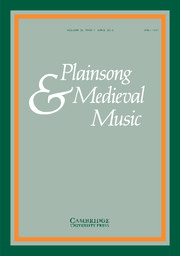
Plainsong & Medieval Music
Scope & Guideline
Rediscovering the Melodies of a Bygone Era
Introduction
Aims and Scopes
- Liturgical Music Studies:
The journal emphasizes the study of liturgical music, exploring its role and evolution within religious contexts, including specific rites, traditions, and regional practices. - Music Theory and Notation:
Research on medieval music theory and notation is a core focus, examining manuscripts, theoretical texts, and the scribal practices that shaped the understanding and transmission of music during the medieval era. - Regional and Cultural Contexts:
The journal delves into the regional variations of medieval music, highlighting how local traditions and cultural influences shaped musical practices in different areas, such as England, Italy, and Spain. - Manuscript Studies:
A significant aspect of the journal involves the analysis of historical manuscripts, including songbooks and liturgical texts, which provide insights into the performance and reception of medieval music. - Interdisciplinary Approaches:
The journal promotes interdisciplinary research that connects musicology with history, religious studies, and cultural studies, fostering a broader understanding of medieval music's impact and significance.
Trending and Emerging
- Interdisciplinary Research:
There is a growing trend towards interdisciplinary studies that connect music with broader cultural, historical, and social contexts, highlighting how music reflects and influences societal changes. - Manuscript Reconstruction and Analysis:
Recent publications have increasingly focused on the reconstruction and detailed analysis of medieval manuscripts, showcasing their importance in understanding historical music practices. - Local and Regional Studies:
Emerging research is concentrating on specific regional practices and local traditions, providing a more nuanced understanding of how geography influences musical forms and liturgical practices. - Revival of Historical Performance Practices:
There is a notable interest in the revival and study of historical performance practices, which aims to recreate medieval music as it may have been performed in its original context. - Music and Identity:
The exploration of how music contributes to identity formation during the medieval period is gaining traction, particularly in relation to cultural and religious identities.
Declining or Waning
- Vernacular Music:
There has been a noticeable decrease in the exploration of vernacular music in medieval contexts, suggesting a possible shift back towards more liturgical and sacred music studies. - Secular Music Practices:
Research on secular music practices appears to be waning, with fewer studies addressing the role of secular songs and their interaction with liturgical traditions. - Music and Politics:
The intersection of music with political themes or events in medieval history has become less prominent, indicating a potential narrowing of focus towards more strictly musical or liturgical analyses.
Similar Journals

MUSIKFORSCHUNG
Connecting Scholars to the Heart of Music ResearchMUSIKFORSCHUNG is a distinguished journal in the field of music studies, published by NEUWERK-BUCH UND MUSIKALIENHANDLUNG in Germany. With its ISSN 0027-4801, the journal caters to scholars, practitioners, and students interested in the diverse realms of musicology. Although it is currently not an Open Access publication, MUSIKFORSCHUNG plays a vital role in the academic landscape by disseminating research and critical discourse on music from various historical and contemporary perspectives. The journal has established its worth in the academic community, being categorized in the Q4 quartile in Music for 2023 and holding a rank of #169 out of 180 in the Scopus Arts and Humanities Music category, placing it within the 6th percentile. With publication activities spanning from 2002 to 2013 and resuming in 2016 through to 2024, MUSIKFORSCHUNG continues to be a crucial resource for those dedicated to advancing music scholarship. Set in the cultural heart of Kassel, Germany, the journal invites contributions that foster an understanding of music's impact on society and culture.
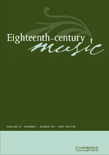
Eighteenth-Century Music
Decoding the Melodies of a Rich Musical HeritageEighteenth-Century Music, published by Cambridge University Press, serves as a pivotal platform for scholarly discussion surrounding music from the eighteenth century, ranging from musicology to cultural studies. With an ISSN of 1478-5706 and an E-ISSN of 1478-5714, this journal offers a unique lens into the musical landscape of the era, dissecting its myriad influences and contexts. Although it currently holds a Q4 ranking in the field of Music as per the 2023 category quartiles, its contributions are invaluable for researchers, professionals, and students eager to delve into historical music research. Operating from the United Kingdom, with an address at Edinburgh Bldg, Shaftesbury Rd, Cambridge, England, this journal invites submissions that engage with the long-standing traditions and transformative contexts of the period. By fostering an academic dialogue among its readership, Eighteenth-Century Music aims to illuminate the complexities and innovations within the realm of eighteenth-century music studies.

RIVISTA ITALIANA DI MUSICOLOGIA
Unveiling the Rich Tapestry of Musical KnowledgeRIVISTA ITALIANA DI MUSICOLOGIA, published by the Italian Society of Musicology, is a distinguished journal dedicated to the field of musicology, offering a platform for scholarly research and discourse on a wide array of musical topics. With an ISSN of 0035-6867 and an E-ISSN of 2036-5586, this journal has contributed significantly to the understanding of music in cultural and historical contexts. Although the scope of coverage was marked from 2003 to 2008 in renowned databases like Scopus, the journal continues to serve as an invaluable resource for researchers, educators, and students embroiled in music studies. Its emphasis on rigorous research and critical analysis makes it a vital asset for anyone seeking to deepen their knowledge of musicological inquiry. While not an open-access publication, the RIVISTA ITALIANA DI MUSICOLOGIA remains a prestigious outlet for scholarly contributions that reach audiences eager to explore the complexities of musical heritage.

Problemy Muzykalnoi Nauki-Music Scholarship
Enhancing Understanding of Music's Diverse DimensionsWelcome to Problemy Muzykalnoi Nauki-Music Scholarship, a leading journal in the field of music scholarship published by the esteemed Gnesin Russian Academy of Music. With an ISSN of 2782-358X and an E-ISSN of 2782-3598, this Open Access journal has been committed to the dissemination of high-quality research since 2009, making scholarly work accessible to a global audience. Covering diverse aspects of music theory, history, and its socio-cultural impacts, Problemy Muzykalnoi Nauki serves as an essential platform for scholars, educators, and practitioners in the arts and humanities, as well as in social sciences related to music education. While its Scopus coverage was discontinued in 2021, the journal remains influential, holding a rank of #48 in the Arts and Humanities category and a percentile of 67th, showcasing its relevance and rigor in the discipline. We invite researchers and students alike to explore the rich contributions made within these pages, fostering a deeper understanding and appreciation of music in contemporary society.
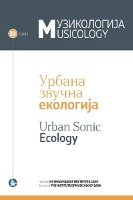
Muzikologija-Musicology
Illuminating the Rich Tapestry of Musical HeritageMuzikologija-Musicology, published by the esteemed Serbian Academy of Sciences and Arts, Institute of Musicology (SASA), serves as a pivotal platform for scholarly discourse in the field of musicology. With its ISSN 1450-9814 and E-ISSN 2406-0976, this open-access journal has been committed to disseminating high-quality research since 2002, making significant contributions to the understanding and analysis of music in diverse cultural contexts. Located in Belgrade, Serbia, the journal proudly holds a Q2 ranking in the Music category for 2023, reflecting its high-impact contributions as evidenced by its Scopus rank of #136/180 and a percentile of 24th. Covering a wide array of topics within music, from ethnomusicology to music theory and history, it invites contributions that push the boundaries of music research. By fostering an open-access model, Muzikologija-Musicology aims to ensure that its findings are accessible to a global audience, thereby enriching the discourse and fostering collaboration in the musicology community.
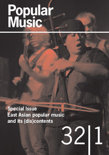
Popular Music
Unveiling the Dynamics of Popular CulturePopular Music, published by Cambridge University Press, is a leading academic journal that has been at the forefront of contemporary music studies since its inception in 1981. With its comprehensive scope encompassing a rich diversity of topics within the fields of Cultural Studies and Music, this journal holds a respectable Q2 ranking in both categories as of 2023, underscoring its significant impact on the scholarly discourse surrounding popular music. Researchers, professionals, and students alike will find invaluable insights within its pages as it explores the socio-cultural dynamics of music from various global perspectives. While it is not an open-access journal, the publication aims to foster critical dialogue and interdisciplinary scholarship. Based in the United Kingdom, Popular Music serves as a vital resource for those interested in the intersections of music, culture, and society, sustaining a vibrant academic community through rigorous peer-reviewed articles and reviews. Engage with the latest research and deepen your understanding of popular music's ever-evolving landscape.

MUSIK UND KIRCHE
Exploring the Harmony of Faith and SoundMUSIK UND KIRCHE is a distinguished journal published by BARENREITER-VERLAG that offers a scholarly platform for the exploration of the intersections between music and ecclesiastical contexts. With an ISSN of 0027-4771 and an E-ISSN of 2568-3128, this journal is particularly valuable for researchers, practitioners, and students engaged in musicology, religious studies, and cultural history. Although currently not open access, it provides a wealth of peer-reviewed articles that enhance understanding of music's role within church tradition and practice, thereby contributing significantly to the field. Despite fluctuating visibility in academic rankings—standing in Q4 of the 2023 category for Music, based on Scopus evaluations—its historical coverage from 2002 to 2012 and resumed publication since 2020 demonstrates its commitment to fostering rigorous academic discourse. The journal is based in Kassel, Germany, and serves as an essential resource for anyone interested in the dynamic relationship between music and spiritual life.

Musicologica Brunensia
Bridging Cultures and Ideas Through MusicMusicologica Brunensia, an esteemed journal published by Masaryk University, Faculty of Arts, serves as a significant platform for the dissemination of knowledge in the field of musicology. Based in the Czech Republic, this Open Access journal has been facilitating scholarly communication since 2009, allowing unrestricted access to its rich array of research articles. With an ISSN of 1212-0391 and an E-ISSN of 2336-436X, Musicologica Brunensia proudly holds a Q3 ranking in the Music category as of 2023, reflecting its dedication to advancing research in the arts and humanities, particularly music. The journal accepts contributions spanning diverse topics within music studies, fostering interdisciplinary dialogue among researchers, professionals, and students alike. Located at Arne Novaka 1, Brno, 60200, Czech Republic, Musicologica Brunensia is poised to continue its journey of promoting innovative scholarship in musicology until 2024 and beyond, making it a valuable resource for anyone passionate about the field.
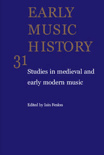
EARLY MUSIC HISTORY
Advancing Scholarship in Early MusicEARLY MUSIC HISTORY is an esteemed academic journal published by Cambridge University Press, specializing in the rich and diverse field of early music, providing a vital platform for research and discourse since its inception. With an ISSN of 0261-1279 and an E-ISSN of 1474-0559, the journal operates from its headquarters in Cambridge, United Kingdom. Known for its scholarly rigor, EARLY MUSIC HISTORY is ranked within the Q2 category in Music, illustrating its significant contribution to the field. The journal covers a broad time frame, examining musical developments from the medieval to the early modern period, and features articles that seek to illuminate historical contexts and contemporary implications of early music practices. Despite lacking the Open Access option, it remains a valued resource for researchers and professionals seeking to advance their understanding of this dynamic area of study. The journal not only fosters a deeper appreciation of early music history but also positions itself as a pivotal contributor to ongoing academic dialogue, making it essential reading for scholars in the arts and humanities.
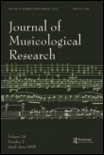
JOURNAL OF MUSICOLOGICAL RESEARCH
Celebrating the Intersection of Music and AcademiaJOURNAL OF MUSICOLOGICAL RESEARCH, published by Taylor & Francis Ltd, is an esteemed platform that delves into the field of musicology, contributing to the ongoing dialogue in music research and scholarship since its establishment in 1979. With an ISSN of 0141-1896 and an E-ISSN of 1547-7304, this journal serves as a vital resource for researchers, professionals, and students, offering insights into diverse musicological topics. Although currently categorized in Q4 in Music with Scopus rankings placing it at #110 out of 180 in the Arts and Humanities field, its commitment to excellence and broader discourses in music studies is evident. The journal does not have Open Access options, yet it provides accessible content through reputable academic channels, fostering scholarly exchanges within the community. It aims to publish high-quality research that advances understanding of musical practices and cultural implications, making it a critical resource for those passionate about music and its myriad influences.